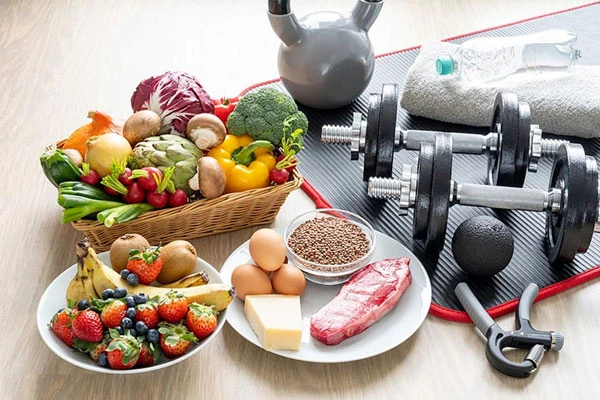Athletes, whether amateurs or professionals, understand the critical role that nutrition plays in unlocking their full potential on the field. The relationship between what an athlete eats and their performance is a dynamic interplay that extends beyond mere sustenance. Optimal nutrition is the cornerstone of peak physical and mental condition, influencing endurance, recovery, and overall athletic prowess.
Understanding the Foundations of Nutrition
At the heart of peak athletic performance lies a foundation of balanced and nutrient-rich diet. Carbohydrates, proteins, fats, vitamins, and minerals are the essential building blocks that athletes must carefully integrate into their meals. Carbohydrates, for instance, serve as the primary energy source, replenishing glycogen stores crucial for sustained physical activity. Proteins aid in muscle repair and growth, while healthy fats provide sustained energy and support various bodily functions.
Tailoring Nutrition to Athletic Goals
Athletes engaged in different sports or training regimens require distinct nutritional approaches tailored to their specific goals. Endurance athletes may emphasize carbohydrates to sustain prolonged efforts, while strength-focused athletes might prioritize protein intake to support muscle development. Precision in nutrient timing becomes crucial—consumption before, during, and after training can significantly impact performance and recovery. Hydration, often overlooked but integral, also plays a pivotal role in maintaining optimal performance levels, with even slight dehydration leading to decreased strength and endurance.
Nutrition as a Performance Enhancer
Beyond its foundational role, nutrition serves as a powerful performance enhancer. Strategic use of supplements, such as protein shakes or electrolyte replacements, can aid in meeting specific dietary needs. Moreover, understanding the impact of micronutrients like vitamins and minerals is essential, as they contribute to functions ranging from oxygen transport to antioxidant defense systems. Antioxidant-rich foods, such as fruits and vegetables, not only support overall health but also mitigate the oxidative stress induced by intense physical activity.
Read more: International Sports Training Camps in Antalya
Better Recovery with Good Nutrition
Post-exercise nutrition is a crucial aspect often underestimated. Consuming a well-balanced meal or snack with the right ratio of nutrients within the recovery window accelerates muscle repair, glycogen replenishment, and overall recovery. Adequate sleep and stress management, both influenced by nutrition, further contribute to an athlete’s ability to perform at their best consistently.
The Evolving Science of Sports Nutrition
As our understanding of sports science and nutrition evolves, athletes and coaches continually adapt their dietary strategies. Personalized nutrition plans, often developed in collaboration with dietitians or sports nutritionists, consider an athlete’s individual needs, training intensity, and body composition. Continuous monitoring and adjustments ensure that the nutritional approach aligns with evolving performance goals and seasonal variations in training.
The Role of Nutrition in Sport Camps in Antalya
Nestled against the stunning backdrop of Antalya’s landscapes, sport camps in this picturesque destination not only offer world-class training facilities but also recognize the paramount importance of nutrition in elevating athletic performance. Athletes participating in these camps find themselves immersed in an environment where the interplay between optimal nutrition and peak physical condition is carefully curated to unlock their full potential.
Tailored Nutritional Strategies
Antalya’s sport camps prioritize individualized nutrition plans, recognizing that the dietary needs of athletes can vary widely based on their sport, training intensity, and personal goals. Collaborating with skilled sports nutritionists, athletes receive tailored strategies that ensure they meet their energy requirements, maintain optimal hydration levels, and facilitate effective recovery. Whether it’s a football camp in Antalya emphasizing endurance or a training program focusing on strength, the nutrition plans are precision-engineered to complement the specific demands of each sport.
Balanced Macronutrient Profiles
A cornerstone of nutrition in Antalya’s sport camps is the emphasis on balanced macronutrient profiles. Carbohydrates take center stage, providing the energy needed for sustained physical exertion. Proteins, critical for muscle repair and growth, are carefully integrated, and healthy fats contribute to overall energy stores. The careful orchestration of these macronutrients not only fuels athletes during their rigorous training sessions but also supports their bodies in the crucial post-exercise recovery phase.
Strategic Timing and Supplementation
Nutrient timing becomes a crucial aspect of the nutritional game plan in Antalya’s sport camps. Coaches and nutritionists guide athletes on when to consume specific nutrients, optimizing their impact on performance and recovery. Whether it’s pre-training meals to fuel energy reserves, intra-training snacks to sustain endurance, or post-training nutrition to kickstart recovery, every aspect is strategically planned. Additionally, judicious use of supplements, such as protein shakes or electrolyte replacements, is integrated for enhanced performance and meeting specific dietary needs.
Read more: Sport Summer Camp in Antalya
Hydration as a Performance Pillar
Antalya’s climate underscores the significance of hydration. Sport camps in this region prioritize hydration as a fundamental performance pillar. Athletes are educated on maintaining proper fluid balance, and coaches emphasize the importance of rehydration strategies during and after training sessions. This focus on hydration not only aids in performance but also helps prevent issues related to heat stress, ensuring athletes can train at their best in the Mediterranean climate.
Culinary Excellence
Antalya’s sport camps extend their commitment to nutrition beyond the training ground to the dining table. Culinary experts curate menus that balance nutritional requirements with culinary excellence. Athletes are treated to a diverse array of nutrient-dense, flavorful meals that cater to their dietary needs. The inclusion of locally sourced, fresh ingredients not only enhances the nutritional value but also introduces athletes to the rich culinary traditions of the region.
Conclusion
In conclusion, the marriage of nutrition and athletic performance is a dynamic and personalized journey. Athletes who prioritize their dietary choices as much as their training regimen unlock a powerful synergy that propels them towards excellence. Recognizing nutrition not merely as sustenance but as a performance enhancer empowers athletes to push their limits, break barriers, and redefine what’s possible in their chosen field of play.
FAQs
- How does nutrition impact athletic performance?
Nutrition plays a fundamental role in athletic performance by providing the body with the energy, nutrients, and hydration needed for optimal function. The right balance of carbohydrates, proteins, fats, vitamins, and minerals supports endurance, muscle repair, and overall physical well-being. Adequate hydration is also crucial for preventing dehydration and maintaining peak performance levels.
- What should athletes eat before a workout or competition?
The pre-workout meal is essential for fueling the body. Athletes should consume a balanced meal rich in carbohydrates, moderate in protein, and low in fat about 2-3 hours before exercise. This provides a readily available energy source while minimizing the risk of discomfort during physical activity. Additionally, staying hydrated before and during the activity is vital.
- How does hydration impact athletic performance?
Hydration is paramount for athletic performance as even mild dehydration can negatively affect strength, endurance, and overall cognitive function. Athletes should drink water regularly throughout the day and pay attention to fluid intake during training or competitions. Electrolyte-rich beverages may be beneficial, especially during prolonged or intense activities, to replenish lost minerals through sweat.
- Are supplements necessary for athletes, and which ones are recommended?
While a well-balanced diet should provide most of the necessary nutrients, certain supplements can be beneficial for athletes with specific needs. Common supplements include protein powders for muscle recovery, electrolyte supplements for hydration, and omega-3 fatty acids for anti-inflammatory effects. However, it’s crucial to consult with a healthcare professional or a sports nutritionist before incorporating supplements to ensure they align with individual requirements.
- How does nutrition contribute to post-exercise recovery?
Post-exercise nutrition is crucial for recovery and muscle repair. Consuming a meal or snack containing a combination of carbohydrates and protein within the first 30 minutes to an hour after exercise helps replenish glycogen stores and initiates the muscle repair process. Adequate hydration is also essential during this recovery period. Tailoring nutrition to support the body’s recovery phase is key for sustained athletic performance.


